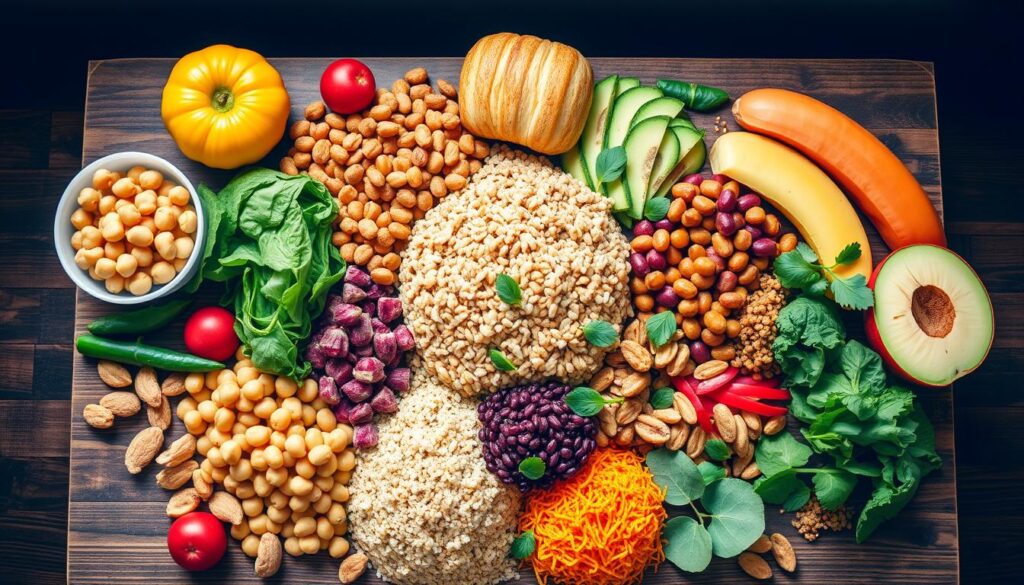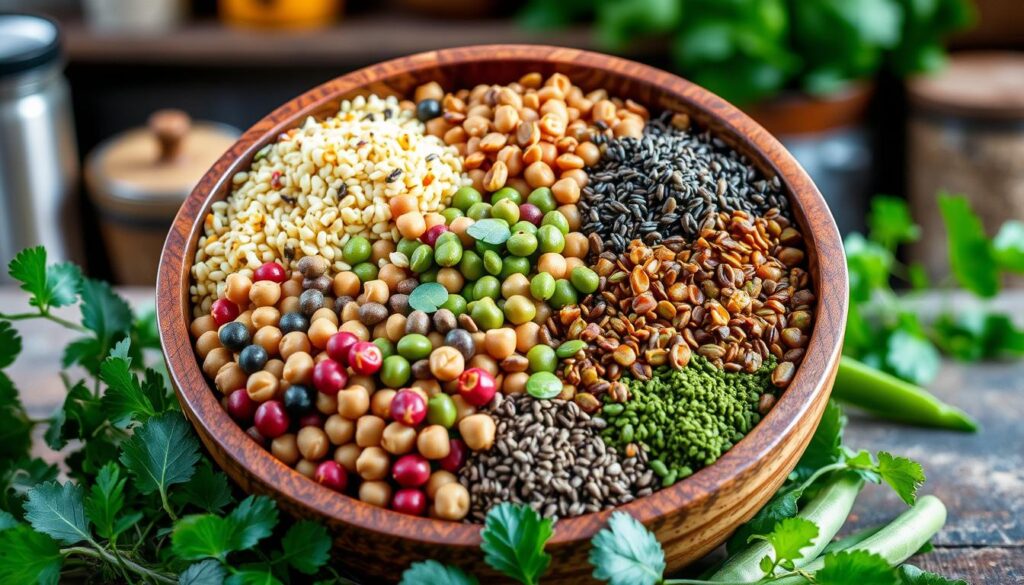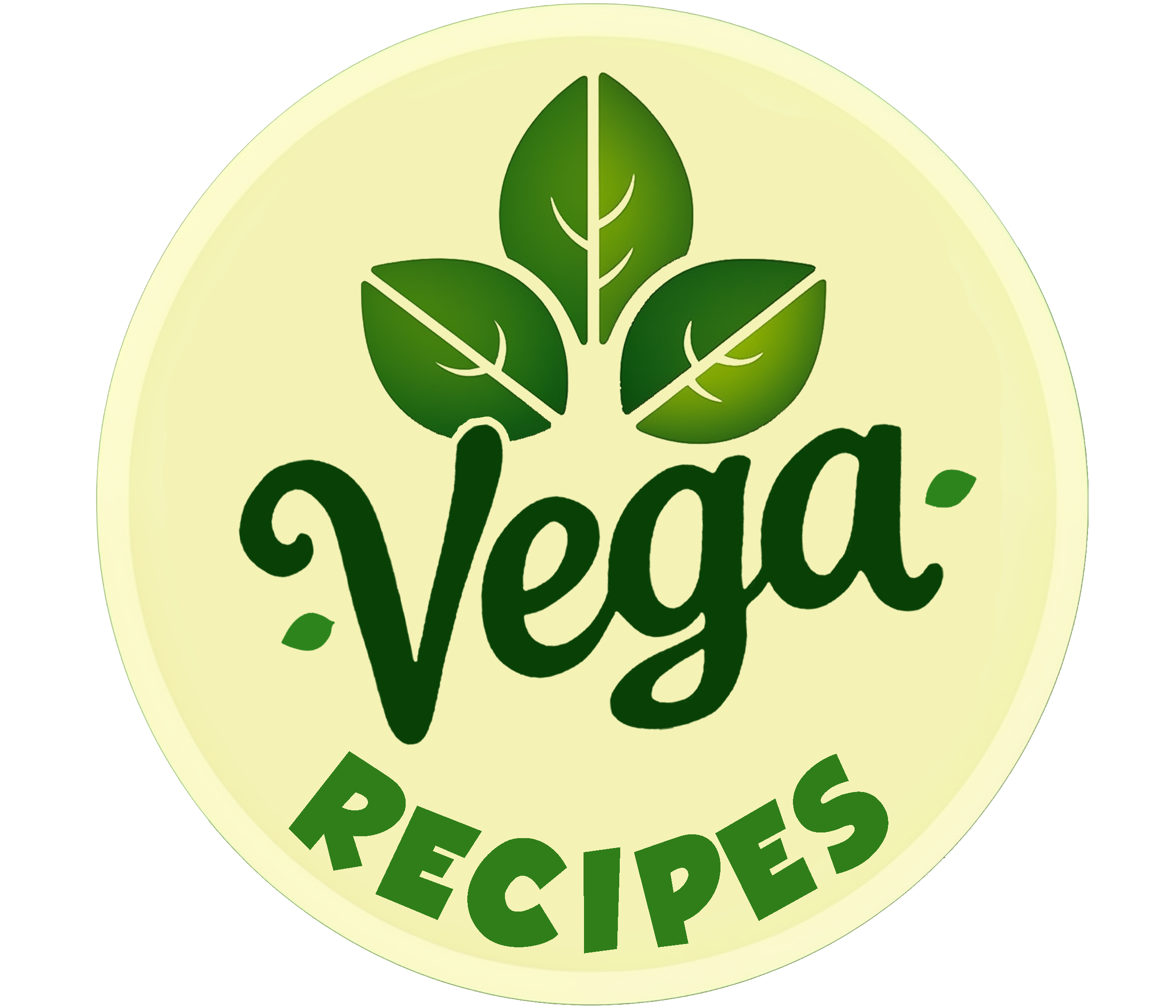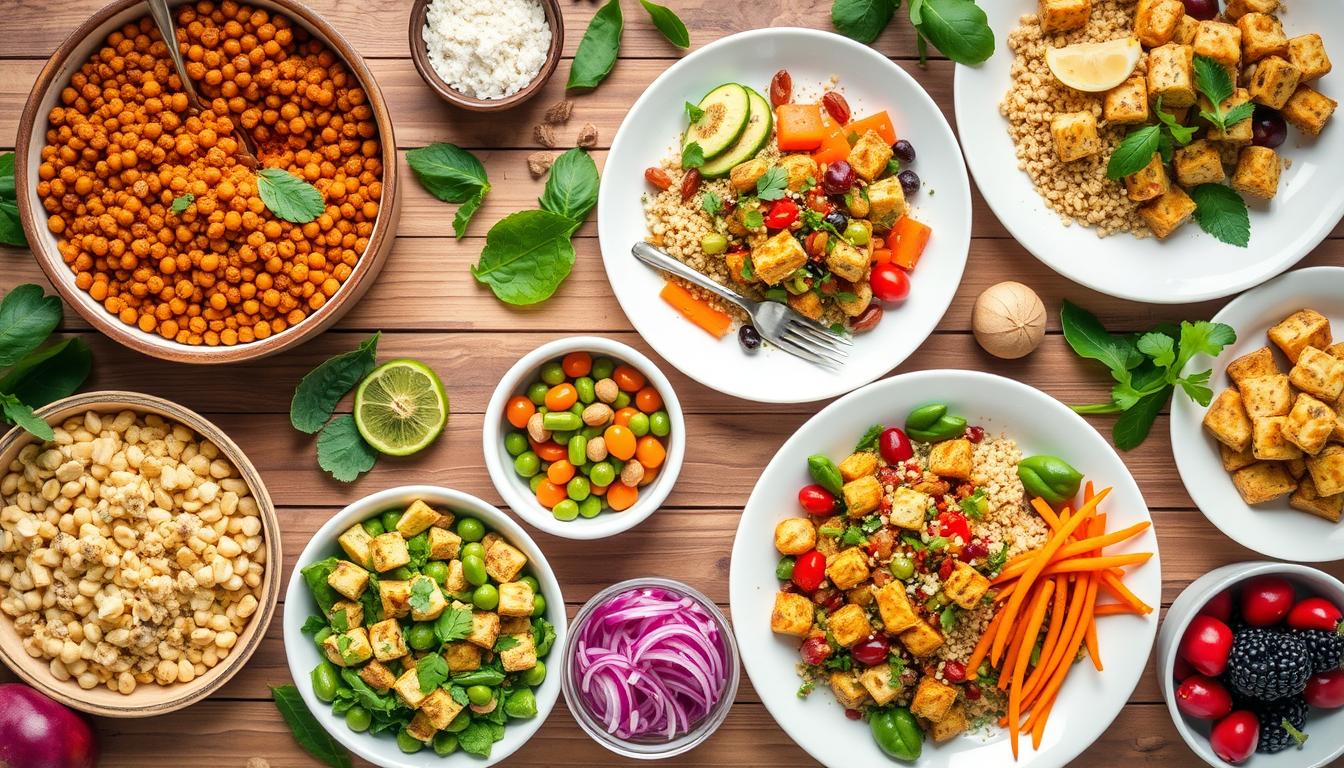I used to be a competitive athlete, and I knew how crucial it was to eat right. Switching to a vegan diet made me worry about getting enough protein. But, I found out that a vegan diet can give you all the amino acids you need.
Table of Contents
If you love working out, or just want to feel better, a high-protein vegan diet can help. It’s packed with nutrients and is kind to animals and the planet. Let’s explore how to build muscle and stay healthy with vegan foods!
The Importance of Protein in a Vegan Diet
Protein: The Building Block of Cells
Protein is key for our bodies. It’s made of amino acids, which build muscles and tissues. We need enough protein to keep these structures strong.
Benefits of Consuming Adequate Protein
Protein takes more energy to digest than carbs or fats. This can help increase your metabolism and support weight loss. You might need more protein if you’re very active, on a vegan diet, or if you’re older or pregnant.
The protein importance vegan diet needs 0.8 grams of protein per kilogram of body weight. For a 140-pound person, that’s about 50 grams of protein daily. This makes up 10 percent of their total calories.
A study showed that vegetarians and vegans eat about 70 percent more protein than needed. Non-vegetarians eat almost 80 grams of protein daily.
« Consuming animal protein is linked to weight gain and other health issues like heart disease, diabetes, inflammation, and cancer. »
But, too much animal protein can increase heart disease risk by 60 percent. It can also lead to early death. This shows why vegans should focus on vegan protein needs and the benefits of plant-based protein.
Beans, lentils, nuts, seeds, and legumes are great sources of protein for vegans. Grains and vegetables in a plant-based diet also have plenty of protein. Seitan, tofu, tempeh, and edamame are also good for plant-based protein.
Plant-Based Protein Sources for Vegans
For those on a vegan or vegetarian diet, there are many plant-based protein sources. These can help you meet your daily protein needs. Adding a variety of these high-protein foods to your meals is key. It ensures your body gets the nutrients it needs.
Legumes: Lentils, Beans, and Chickpeas
Legumes like lentils, beans, and chickpeas are great for protein. Lentils have 18 grams of protein per cup. Black beans and chickpeas have 15 and 14.5 grams per cup, respectively. These legumes are versatile and can be used in many vegan recipes, from stews to dips.
Nuts and Seeds
Nuts and seeds are not just high in protein but also in beneficial fats, minerals, and fiber. Almonds have 9 grams of protein per 1.5-ounce serving. Pumpkin seeds have 8.5 grams of protein per ounce. Other protein-rich options include cashews, walnuts, hemp seeds, and chia seeds.
Soy Products: Tofu, Tempeh, and Edamame
Soy-based foods like tofu, tempeh, and edamame are also high in protein. A 3-ounce serving of tofu has 9 grams of protein. Half a cup of tempeh has 17 grams. Shelled edamame, a favorite snack, has 9 grams of protein per half-cup. Adding these soy products to your vegan diet can help meet your protein needs.
| Food | Protein Content |
|---|---|
| Tempeh | 17 g per 1/2 cup |
| Edamame (shelled) | 9 g per 1/2 cup |
| Tofu | 9 g per 3 ounces |
| Soy milk | 7 g per 1 cup |
| Nutritional yeast | 4 g per 2 tablespoons |
| Seitan | 20 g per 3-ounce serving |
Vegan Diet Plan High Protein: Recipes and Meal Ideas
Starting a high-protein vegan diet doesn’t mean you have to give up taste or variety. CookUnity, a top meal delivery service, offers tasty and healthy high-protein vegan recipes. They help fuel your body with delicious plant-based meals. Whether you want to build muscle, manage your weight, or just enjoy healthy food, CookUnity has you covered.
Their chefs make dishes that are both delicious and packed with protein. You’ll find everything from hearty lentil stews to savory mushroom wellingtons. CookUnity’s menu meets many dietary needs and preferences, including vegan bodybuilding meals.
| Dish | Protein Content |
|---|---|
| Peanut Stew | 20 grams per small portion |
| Brown Lentils | 18 grams per cup |
| Chickpeas | 15 grams per cup |
| White Beans | 17 grams per cup |
| Almonds | 6 grams per ounce |
| Mushrooms Wellington | Protein-packed centerpiece |
| Falafel | 4 grams per small ball |
| Farro | Protein-rich with chewy texture |
CookUnity’s high-protein vegan recipes use many protein-rich foods like lentils, chickpeas, tofu, tempeh, and seitan. This ensures you get the nutrients you need to thrive. Their meal plans offer a balanced mix, with each day providing at least 80 grams of protein and 30 grams of fiber.
Looking to lose weight, build muscle, or just enjoy tasty, healthy meals? CookUnity’s vegan meal ideas and vegan bodybuilding meals are perfect. Enjoy the flavors of plant-based food while giving your body the protein it needs to perform at its best.
Balancing Protein with Other Nutrients
When you start a high-protein vegan diet, it’s important to get all the nutrients your body needs. You should aim for a mix of protein, fiber, and healthy fats. This balance is key to a vegan diet balanced nutrition.
Incorporating Fiber and Healthy Fats
Don’t forget to eat enough fiber and healthy fats for vegans. Fiber helps with digestion and weight control. Healthy fats, like those in avocados and nuts, fight inflammation.
- Try to get 25-30 grams of fiber daily from whole grains, veggies, fruits, and legumes.
- Add healthy fats like nut butters, olives, flaxseeds, and chia seeds to your diet.
Essential Vitamins and Minerals for Vegans
A vegan diet is rich in essential nutrients for vegan diet. But, pay extra attention to some vitamins and minerals:
- Iron: Find it in leafy greens, lentils, and fortified cereals.
- Calcium: Tofu, tempeh, and leafy greens are good sources.
- Vitamin B12: Look for fortified foods or consider a B12 supplement.
By balancing your high-protein vegan diet, you’ll give your body all it needs to stay healthy.

High-Protein Vegan Meal Prep for Weight Management
If you’re aiming for vegan meal prep for weight loss, high-protein, low-carb meals are key. CookUnity has a range of tasty high-protein vegan meals that help with weight management. Their Pesto Chicken and Low-Carb Zucchini Lasagna give you lasting energy and keep you full all day.
A 2021 study found that vegan diets boost gut health and lower cholesterol. Protein is crucial on a vegan diet for weight loss. It helps you lose weight and keep muscle mass.
| Metric | Range |
|---|---|
| Daily Total Cost per Serving | $4.96 to $9.62 |
| Daily Total Calories | 1,189 to 1,224 |
| Daily Total Protein | 48g to 54g |
| Daily Total Carbohydrates | 119g to 174g |
| Daily Total Fiber | 24g to 45g |
| Daily Total Fat | 39g to 62g |
| Daily Total Sodium | 1,029mg to 1,852mg |
Beans are a must in a vegan diet for their protein, carbs, vitamins, minerals, and fiber. They’re great for weight management. Other top vegan protein sources include:
- Nuts and seeds (e.g., peanuts, cashews, walnuts, almonds, pistachio, pecans, pumpkin seeds, sunflower seeds, chia seeds, and flax seeds)
- Soy products (e.g., tofu, tempeh, and edamame)
Adding a mix of high-protein, low-carb vegan meals to your prep can change your weight management game. With the right nutrients, you’ll feel energized, satisfied, and ready to hit your health goals.
Building Muscle on a Vegan High-Protein Diet
To build muscle, you need to eat high-protein meals on a vegan diet. Plant-based proteins are key for muscle repair and growth. Eating the right amount of protein at the right time is crucial for progress.
Workout Routine and Recovery
For muscle building, focus on a balanced workout routine with strength training. Include weightlifting, bodyweight exercises, and resistance training twice a week. Also, don’t forget to rest and sleep well for muscle growth and repair.
Protein Timing and Quantity
Try to eat 1.6-2.2 grams of protein per kilogram of body weight daily. Eat protein-rich foods or snacks every 3-4 hours, especially after workouts. Use a mix of plant-based proteins like legumes, tofu, tempeh, and quinoa to get all essential amino acids.
| Protein Source | Protein Content (per 100g) |
|---|---|
| Lentils | 9g |
| Chickpeas | 15g |
| Tofu | 8g |
| Tempeh | 19g |
| Quinoa | 4g |
| Almonds | 21g |
Building muscle on a vegan bodybuilding diet is possible with the right nutrition and workout plan. A high-protein vegan diet for muscle gain and strength training are key. This way, you can reach your building muscle on vegan diet goals.
« Consuming a variety of plant proteins maximizes muscle-building potential by ensuring essential amino acids intake. »
Benefits of a High-Protein Vegan Diet
Switching to a high-protein vegan diet brings many advantages. It’s good for your health and the planet. You’ll get energy from plant-based proteins to keep up with your day and workouts.
Improved Energy Levels
Protein is key for energy, and a vegan diet can keep you going all day. About 3% of Americans follow a vegan diet. They say they feel more energetic and focused with more plant-based proteins like legumes, nuts, and soy.
Environmental Impact
A high-protein vegan diet also helps the environment. Animal farming causes a lot of greenhouse gas emissions and deforestation. Choosing plant-based proteins reduces your carbon footprint and supports a greener food system.
Looking to boost your energy or help the planet? A high-protein vegan diet might be what you need. Adding various plant-based proteins to your meals leads to a healthier, more eco-friendly lifestyle.
Addressing Common Concerns and Myths
Many people think vegan diets lack complete proteins and essential nutrients. But, with the right foods, vegans can easily meet their protein needs. They can thrive on a plant-based diet.
Obtaining Complete Proteins
It’s a myth that vegan diets are hard to get complete proteins. This is not true. By eating a variety of vegan protein complete proteins like legumes, tofu, and quinoa, vegans get all the amino acids they need.
- Legumes like lentils, beans, and chickpeas are great for protein, with 18-25 grams per cup.
- Soy products like tofu and edamame have 10-20 grams of protein per serving.
- Quinoa, a whole grain, has 8 grams of protein per cup, making it a complete vegan protein.
- Nuts, seeds, and their butters add 5-10 grams of protein per serving, helping to round out a vegan diet.
Overcoming Nutrient Deficiencies
While a vegan diet is rich in nutrients, some like iron, calcium, and vitamin B12 need extra attention. Fortified foods or supplements can help vegans meet these needs.
- Iron-rich foods include lentils, chickpeas, tofu, quinoa, and spinach.
- Calcium is found in almonds, sesame seeds, tofu, fortified plant milks, and leafy greens.
- Vitamin B12 is in fortified foods or supplements, ensuring vegans get enough.
Vegans can thrive by eating a variety of plant-based foods. They can meet all their body’s needs.

« A well-planned vegan diet can provide the body with more than enough protein. »
Tips for Transitioning to a High-Protein Vegan Diet
Switching to a high-protein vegan diet is a step-by-step journey. Start by adding more plant-based proteins like legumes, nuts, and soy products to your meals. Try new recipes and check out the many vegan protein options out there.
Make sure you get all the nutrients you need. The US Department of Agriculture says you need 0.8 grams of protein for every kilogram of body weight. For example, a 190-pound person should eat about 68.8 grams of protein daily.
Quinoa has 8 grams of protein per cup when cooked. Brown rice has 5 grams per cup. Chickpeas give you 14.5 grams of protein per cup, and lentils offer 17.9 grams. Nutritional yeast, a great vegan ingredient, has 3 grams of protein in two teaspoons and lots of vitamin B12.
With some planning and creativity, you can eat a high-protein vegan diet that fits your health and fitness goals. Slowly adding new plant-based proteins can help you smoothly switch to a transitioning to high-protein vegan diet that’s right for you.
- Gradually add more plant-based protein sources to your meals.
- Try new recipes and look at different vegan protein options.
- Watch your nutrient intake and think about supplements if needed.
- Go for the daily protein goal of 0.8 grams per kilogram of body weight.
- Look into high-protein foods like quinoa, chickpeas, lentils, and nutritional yeast.
By using these tips, you can easily switch to a tips for vegan diet changes that gives your body the protein it needs. It will also match your health and lifestyle choices.
Conclusion
A high-protein vegan diet is a great way to fuel your body and reach your health goals. It includes plant-based proteins like legumes, nuts, and soy products. These help with muscle growth, weight management, and overall health.
It also helps the environment by reducing carbon footprint. With some planning, you can make tasty, high-protein vegan meals. These meals will nourish your body and help you achieve your goals.
Whether you want to build muscle, lose weight, or just feel better, a high-protein vegan diet can help. Explore the many plant-based protein sources out there. Enjoy the benefits of eating healthy, nutrient-rich foods. With effort and creativity, a high-protein vegan diet can be a success.

